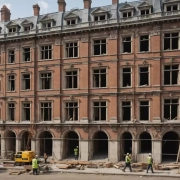Navigating the Construction Maze: Why Understanding Qualified vs Licensed Builders is Crucial for Your Business Success
In the world of construction, understanding the nuances between a qualified and a licensed builder can be the difference between a smooth project and a potential nightmare. If you’re a business owner embarking on a construction journey, it’s crucial to grasp these distinctions to ensure your project is in capable hands. So, let’s dive into what sets these two apart and why it matters for your business.
When you’re planning a construction project, whether it’s a new office building or an expansion of your existing premises, you need someone who knows the ropes. A qualified builder is someone who’s undergone formal education and training in construction-related fields. Think of them as the architects of knowledge—they’ve got diplomas, degrees, or certifications that arm them with the theoretical know-how to tackle complex construction tasks. They understand the nitty-gritty of structural integrity, material science, and project management. In short, they’re the ones who can make sense of blueprints and bring them to life.
On the flip side, a licensed builder is someone who’s been given the legal thumbs-up to operate in a specific area. In Sydney, for instance, builders need a valid license from the NSW Fair Trading. This isn’t just a piece of paper; it’s a testament to their competency and adherence to local building codes and regulations. It’s like having a badge that says, “I play by the rules.” This legal requirement ensures that the builder is accountable and operates within the law, safeguarding you from potential legal and financial pitfalls.
Now, you might be wondering, “Why do I need both?” Well, imagine hiring a chef who’s read every cookbook but never stepped into a kitchen, or one who’s cooked for years but never bothered with food safety regulations. Neither scenario is ideal, right? Similarly, a builder who’s both qualified and licensed is like having the best of both worlds. They bring a wealth of knowledge and are legally recognised to execute your project safely and efficiently.
Speaking of which, if you’re keen on delving deeper into this topic, Magico Constructions has an insightful blog post titled ‘Qualified vs Licensed Builders: What’s The Difference?’ that breaks down these concepts even further. They’re seasoned experts in the Sydney construction scene, and their article offers a detailed perspective on why these distinctions matter. It’s a must-read if you’re serious about making informed decisions for your construction projects.
But let’s not stop there. Choosing the right builder is just one piece of the puzzle. As a business owner, you also need to consider the builder’s experience and reputation. Ever heard the saying, “Experience is the best teacher”? In construction, this couldn’t be truer. An experienced builder brings with them a treasure trove of lessons learned from past projects. They’ve navigated the challenges, found innovative solutions, and honed their craft over time. This experience is invaluable, especially when unexpected hurdles arise during your project.
Moreover, a builder’s reputation is like their calling card. It speaks volumes about their reliability, quality of work, and customer service. Don’t just take their word for it—seek out reviews, ask for references, and perhaps even visit some of their completed projects. It’s like dating; you wouldn’t commit without getting to know them first, right?
In conclusion, embarking on a construction project is a significant investment, and choosing the right builder is crucial to its success. By understanding the roles of qualified and licensed builders, and considering their experience and reputation, you’re setting your project up for success. For those who want to explore more about construction standards and best practices, the Australian Building Codes Board offers a wealth of resources that can guide you through the regulatory landscape.
Remember, in construction, as in life, knowledge is power. Equip yourself with the right information, and you’ll be well on your way to building a project that stands the test of time.







